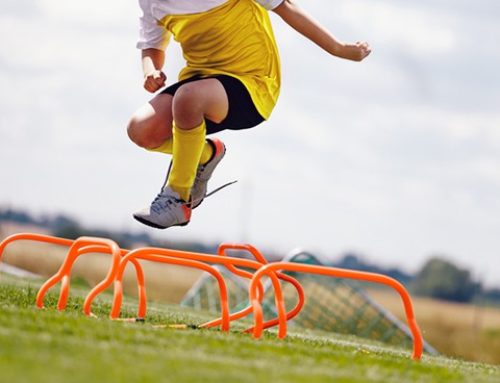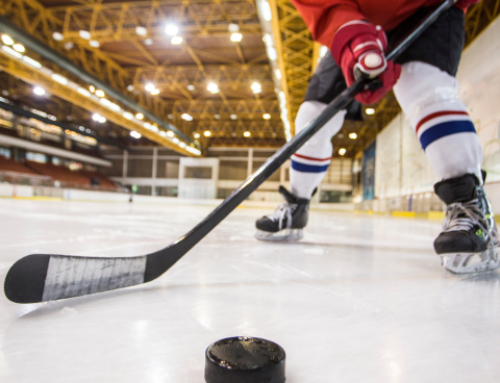You go out to play the puck but mishandle it, putting it right on an offensive player’s stick, and he scores in the open net. A long, clean shot from center ice grazes the outside of your leg pad and settles in the back of the net. You drop for a butterfly save but don’t squeeze the pads, and the puck goes five hole.
Such bad goals are a fact of life for hockey goalies. Even NHL goalies allow the occasional puck to slip through, sometimes in critical moments.
As a hockey goalie, you can feel totally alone when a bad goal goes in. You can put all the blame on yourself, but at the end of the day, hockey is a team game. Chances are there was some other breakdown on the play for which a teammate was responsible. Having a strong mental recovery plan for bad goals will make you a better goalie.
You cannot go back in time and make the save, but simple sport psychology tips can help you recover from a bad goal.
1) Body Language
After a bad goal, try to keep your body language neutral and immediately line up for the faceoff. When you throw your head back or smash your stick on the ice, you are showing defeat and weakness, not only to your opponents but also to your teammates. Your team has to trust that you are ready to continue, and your body language is the first thing they will read.
2) Self-Talk
Acknowledge the fact that bad goals happen and normalize the experience. This eliminates the “significance” of the mistake. Remind yourself that even the best goalies in the world allow bad goals. Make an affirmative statement that confirms your mental toughness, like “I am a Warrior” or “I cannot be broken.”
3) Visualization
Replay the shot but see yourself making the save. This will help you correct whatever mistake you might have made and will give you a sense of confidence in similar situations later on. You will know that you can make the save.
4) Refocus
By the time the bad goal has happened, it has become something uncontrollable and in the past. Focus on what you can control such as the next save. Learn a lesson about what you can do better on the next shot, and put the lesson in the form of cue words—short reminder phrases like “stick down,” “squeeze the pads” or “cut the angle.” Ignore the scoreboard and treat the game like it is 0 to 0.
5) Relax
If your adrenaline is flowing and your nerves are making your energy level too high, take a circle breath. If your body reacts with muscle tension, tighten the muscle further by squeezing as hard as you can for three seconds, then just drop the muscle down or open. Repeat if necessary.
Photo Credit: ingoalmag.com
RECOMMENDED FOR YOU
MOST POPULAR
You go out to play the puck but mishandle it, putting it right on an offensive player’s stick, and he scores in the open net. A long, clean shot from center ice grazes the outside of your leg pad and settles in the back of the net. You drop for a butterfly save but don’t squeeze the pads, and the puck goes five hole.
Such bad goals are a fact of life for hockey goalies. Even NHL goalies allow the occasional puck to slip through, sometimes in critical moments.
As a hockey goalie, you can feel totally alone when a bad goal goes in. You can put all the blame on yourself, but at the end of the day, hockey is a team game. Chances are there was some other breakdown on the play for which a teammate was responsible. Having a strong mental recovery plan for bad goals will make you a better goalie.
You cannot go back in time and make the save, but simple sport psychology tips can help you recover from a bad goal.
1) Body Language
After a bad goal, try to keep your body language neutral and immediately line up for the faceoff. When you throw your head back or smash your stick on the ice, you are showing defeat and weakness, not only to your opponents but also to your teammates. Your team has to trust that you are ready to continue, and your body language is the first thing they will read.
2) Self-Talk
Acknowledge the fact that bad goals happen and normalize the experience. This eliminates the “significance” of the mistake. Remind yourself that even the best goalies in the world allow bad goals. Make an affirmative statement that confirms your mental toughness, like “I am a Warrior” or “I cannot be broken.”
3) Visualization
Replay the shot but see yourself making the save. This will help you correct whatever mistake you might have made and will give you a sense of confidence in similar situations later on. You will know that you can make the save.
4) Refocus
By the time the bad goal has happened, it has become something uncontrollable and in the past. Focus on what you can control such as the next save. Learn a lesson about what you can do better on the next shot, and put the lesson in the form of cue words—short reminder phrases like “stick down,” “squeeze the pads” or “cut the angle.” Ignore the scoreboard and treat the game like it is 0 to 0.
5) Relax
If your adrenaline is flowing and your nerves are making your energy level too high, take a circle breath. If your body reacts with muscle tension, tighten the muscle further by squeezing as hard as you can for three seconds, then just drop the muscle down or open. Repeat if necessary.
Photo Credit: ingoalmag.com












